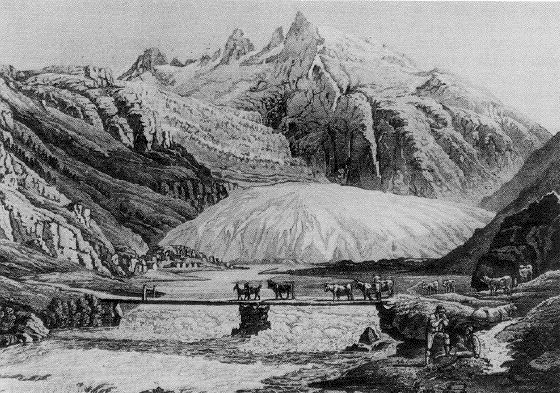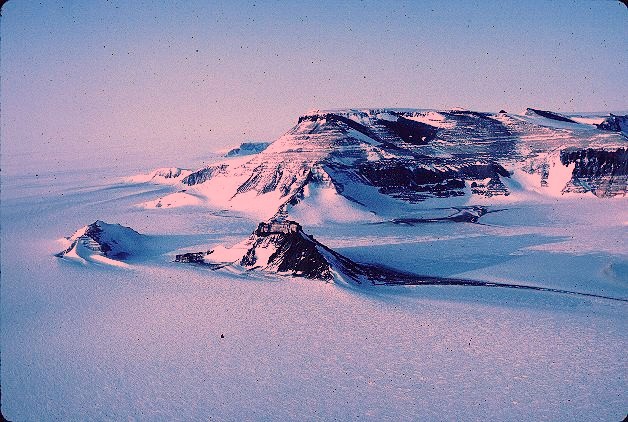

Rhone Glacier in Switzerland in the early 1800's, during the Little Ice Age. Today it is has retreated far up the mountain.
What are glaciers? How did they alter our environment in the past, and will they alter it further in the future? Why do some glaciers surge forward rapidly every few decades, and why do some glaciers discharge catastrophic outburst floods? How do glaciers respond to environmental change? The Greenland and Antarctic ice sheets are over 2 miles thick; but will they grow or shrink with global warming? How fast can we enter or recover from an ice age? How can the thick polar ice caps preserve a record of past climate changes?
This class will explore scientific principles governing ice on our world, in order to understand why glaciers form the most rapidly changing solid surfaces on our planet. You will learn about glaciers in Washington and the world. You will discover how to read the ancient record of the atmosphere and climate trapped inside glaciers. You will explore ice-age cycles, their causes, and their profound effects on our environment. Melting glaciers are a primary cause of rising global sea level today, and they could trigger climate changes in the future. Learn about the search for life in a great lake under nearly 3 miles of ice in Antarctica.
In the lab, you will form groups to investigate how glaciers work. You will examine environments changed by the ice, and you will evaluate the potential impacts of glaciers on our future world. There will be field trips to see how glaciers have changed Seattle.
NO PREREQUISITES

Glaciers from the East Antarctic Ice Sheet flow through the Transantarctic Mountains to the Ross Sea.
Instructor: Ed Waddington (Earth and Space Sciences) edw@ess.washington.edu
Teaching Assistant: Joe MacGregor (Earth and Space Sciences) joemac@ess.washington.eduClass Information: for Winter 2007.
Class Schedule for Winter 2007.
Link to secure class page.
Extra Reading Sources about Glaciers
Extra Reading Sources about Climatology
Laboratory Supplementary Information.
Information about Group Projects.
Note that the Department of Earth and Spaces Sciences offers several complementary courses on different aspects of glaciers, ice sheets and climate change. Students with special interest in glaciers and ice ages, and suitable background, can take more than one of these courses to gain complementary information, experience and understanding of the natural world.
Earth and Space Sciences 203, "Glaciers and Global Change", focuses on understanding how a glacier works, and on simple approaches to examine and understand processes and time scales in the natural world. It emphasizes how glaciers and polar ice sheets like Antarctica can both influence our lives by their actions, and also record past changes in our environment. Geophysics 203 is intended for both nonscientists and scientists; it has no prerequisites.
Earth and Space Sciences 302 , "Great Ice Age", focuses on the geological evidence of past glaciations and the geological processes that have modified Earth's landscapes and climates during Ice Ages. Geology 302 has a prerequisite of a basic Geology course (101, 201, or 205).
Earth and Space Sciences 431, "Principles of Glaciology", takes students on a tour through the cryosphere, the places where ice exists on the planet. Topics include ice in the atmosphere, snow, avalanches, glaciers, polar ice sheets and floating ice shelves, sea ice, and permafrost. Glacier erosion and deposition processes that shape landscapes like Puget Sound, environmental records in polar ice cores, and Ice Age cycles and responses of glaciers to climate change are also covered. The theme that ties these topics together is a physical understanding of ice and water and how they behave, e.g. through the phase diagram of H2O. Geol/Gphys 415 has a prerequisite of Physics 121/122.